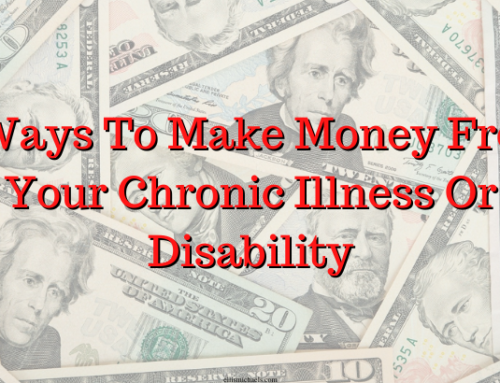Having a little money tucked away is never a bad thing. It can be saved up over time to take a vacation. Or you could build up your savings to have in case of some kind of emergency. I like to save money in case I need an emergency vacation. You never know when the need for some tropical sun is gonna pop up!
And for those of us living with chronic illnesses, it never hurts to have some extra cash to take care of unexpected medical costs. But whatever your reasons for wanting to save money, doing so doesn’t have to be difficult. So let’s get right to it. Here’s a list of 10 easy things that you can do to save money.
10 Easy Ways To Save Money
Table of Contents
1. Pay off your debt
If you are serious about saving money, this is the first thing you should do. By paying interest on credit cards and other loans, you’re throwing away money. Well, more like you’re freely handing it over to companies that already have way too much of it.
If you have more than one credit card, consider transferring all of your debt onto the card with the lowest interest rate. If this isn’t possible, then pay off your card with the highest interest rate first, and as fast as you can. Then pay off your other cards in order from highest interest rate to the lowest.
You can’t save money if you’re paying interest on loans for things you’ve already purchased. Getting out of debt is the best thing you can do to put yourself in a position to save money.
2. Set an automatic payment to your savings account
This is a super-easy way to save money. If you have a regular income, take a small amount and put it into a savings account every time you get paid.
 If you have your paycheck deposited directly into your checking account, then you can easily set up deposits into a savings account. You can have a certain percentage (say, 3-5%) of you paycheck sent to your savings account. Or you can set a specific amount to be deposited every time you get paid.
If you have your paycheck deposited directly into your checking account, then you can easily set up deposits into a savings account. You can have a certain percentage (say, 3-5%) of you paycheck sent to your savings account. Or you can set a specific amount to be deposited every time you get paid.
You can usually set this up with your bank in one day. Sometimes it can be done online without even having to leave the house. Then you can just sit back and watch the savings pile up!
3. Pack your lunch
If you’re like most people, you probably eat out during the work week. It’s convenient and, if you live in America, there’s tons of fast food options. But eating out can be very expensive.
Consider packing your lunch. If not everyday, then a few times a week. You’ll save tons of money. And this has the added benefit of giving you the option to eat a little healthier.
4. Wait 30 days before making purchases
 Don’t worry. That sweet new iPod you want will still be there in a month (if a newer version isn’t already out). Give yourself 30 days to think about buying something new that you want. You’ll often find that after 30 days (or less), you really don’t want it as bad as you thought you did.
Don’t worry. That sweet new iPod you want will still be there in a month (if a newer version isn’t already out). Give yourself 30 days to think about buying something new that you want. You’ll often find that after 30 days (or less), you really don’t want it as bad as you thought you did.
That’s because we humans love new things. We’re biologically programmed to notice novelty. And we’re culturally programmed to buy everything that we see.
Don’t give in to your programming. Think for yourself. It may be temporarily satisfying to buy new things, but the novelty often wears off before we even get the bill. Instead of making impulse buys, think about it for a month. If after a month you still want it, then go for it.
5. Make a shopping list and (try to) stick to it
Going food shopping without a list is like going food shopping on an empty stomach. You’re gonna buy a bunch of stuff that looks good at the time, but you end up regretting it later.
What I like to do is keep a shopping list in my phone’s notepad app. Whenever I think of something that I need, I write it in the app. Then, when I go to the grocery store, I already know what I’m getting.
This doesn’t mean that I stick to my list 100%, all the time. I may pick up one or two things that I see that aren’t on my list. But, for the most part, I follow my list and it’s saved me tons of money over the years.
6. If you’re not using it, shut it off
 This doesn’t apply to you unless you pay an electricity bill. If you don’t then, by all means, turn on all the lights, crank up the air conditioner, and fire up every appliance you can find. It won’t affect your savings at all.
This doesn’t apply to you unless you pay an electricity bill. If you don’t then, by all means, turn on all the lights, crank up the air conditioner, and fire up every appliance you can find. It won’t affect your savings at all.
But if you do pay for electricity, then stop leaving things on that you aren’t using. I’ll admit, before I started having to pay for my own electricity, I would leave every light, fan, appliance, TV, and computer on all day, every day. But now, I’m like a professional electricity conservationist. If I’m not using it, it’s off.
Get in the habit of shutting things off that you’re not using. Before long it will become second nature. Over time you’ll save a lot of money and you’ll be helping to save the environment.
7. Buy generic instead of brand name items
Did you know that many (maybe even most) generic products are made in the same exact factories as their brand name counterparts?
It’s true. Tons of foods and other household items are mass produced in factories (usually outside of the US). Then, those items are packaged and labeled to be sold. Some are packaged as brand name products, and others as generic. But the product is the exact same in each. The only thing that’s different is the price.
Whenever possible, buy generic or store brand instead of big name brands. The quality is usually as good, if not exactly the same.
Some generic items, of course, aren’t as good as their brand name counterparts. For example, I’ve tried about 4 or 5 different generic brands of Cookie Crisp cereal. None of them even come close to being as good as real Cookie Crisp (although real Cookie Crisp isn’t as good as real Cookie Crisp used to be. They must have changed their recipe at some point). Sometimes it’s worth spending the extra money. But when you can, buy generic. The savings add up over time.
8. Use the library
Do you buy a lot of books, magazines, and DVDs? If you’re trying to save money, you may want to think about using your local public library more often.
 Public libraries often have all the bestsellers, recent blockbusters, and current periodicals that you might be spending money on. Instead of spending $20 on a book that you’ll read once and then throw on a bookshelf to collect dust, consider checking it out of the library instead.
Public libraries often have all the bestsellers, recent blockbusters, and current periodicals that you might be spending money on. Instead of spending $20 on a book that you’ll read once and then throw on a bookshelf to collect dust, consider checking it out of the library instead.
Libraries often have popular DVDs and CDs that you can check out. And, if you didn’t already know, it’s absolutely free. Just make sure to return your items before the due date. Otherwise you could end up paying a late fee.
9. Shop at the dollar store
I recently started shopping at a local dollar store and I wish I had discovered it sooner. To be honest, I always thought that dollar stores only sold worthless crap. And, to be fair, they do sell some worthless crap. But they also have tons of household items that I’ve been paying full price for as long as I can remember.
Some of the things I get at the dollar store are soap, toothpaste, mouthwash, writing supplies, storage containers, water bottles, kitchen items, and even some foods. And they’re all the same name brands that I was paying full price for. I easily save at least $20 a week by shopping at the dollar store.
These kinds of stores are everywhere. There are 3 within 15 minutes of me. I hit up the dollar store right before I do my other shopping. That way I can check the dollar store for things on my list first. I suggest you do the same. I’ll easily save $1,000 this year by shopping at the dollar store.
10. Find your own ways to save money
This is the most important item on the list. Only you know what you spend your money on. You know yourself better than anyone else (presumably) and you know what you can and can’t live without.
 Personalize the ways that you save. Do you spend $30 a week on coffee? Maybe cut it back to $20 a week. You’ll save $520 a year. Or perhaps you’re addicted to shopping on Amazon, like me. Instead of making online impulse buys at 2 in the morning (I know I’m not the only one who does this), put the 30-day rule into effect. Don’t buy it unless you still want it after 30 days.
Personalize the ways that you save. Do you spend $30 a week on coffee? Maybe cut it back to $20 a week. You’ll save $520 a year. Or perhaps you’re addicted to shopping on Amazon, like me. Instead of making online impulse buys at 2 in the morning (I know I’m not the only one who does this), put the 30-day rule into effect. Don’t buy it unless you still want it after 30 days.
The secret to saving money is to do what works best for you. Figure out what you can cut back on and what you can’t. Create a plan, and stick to it!
Conclusion
And there you have it: 10 easy ways you can save money. I’ve used all of them at one time or another. And I still use many of them on a regular basis.
Saving money doesn’t have to be hard. Sometimes you just have to get a little creative. What do you do to save money? Leave your money-saving tips and tricks in the comments section at the bottom.
Join the Ellis Michaels mailing list to stay up to date with news, new releases, and more.







Leave a Reply